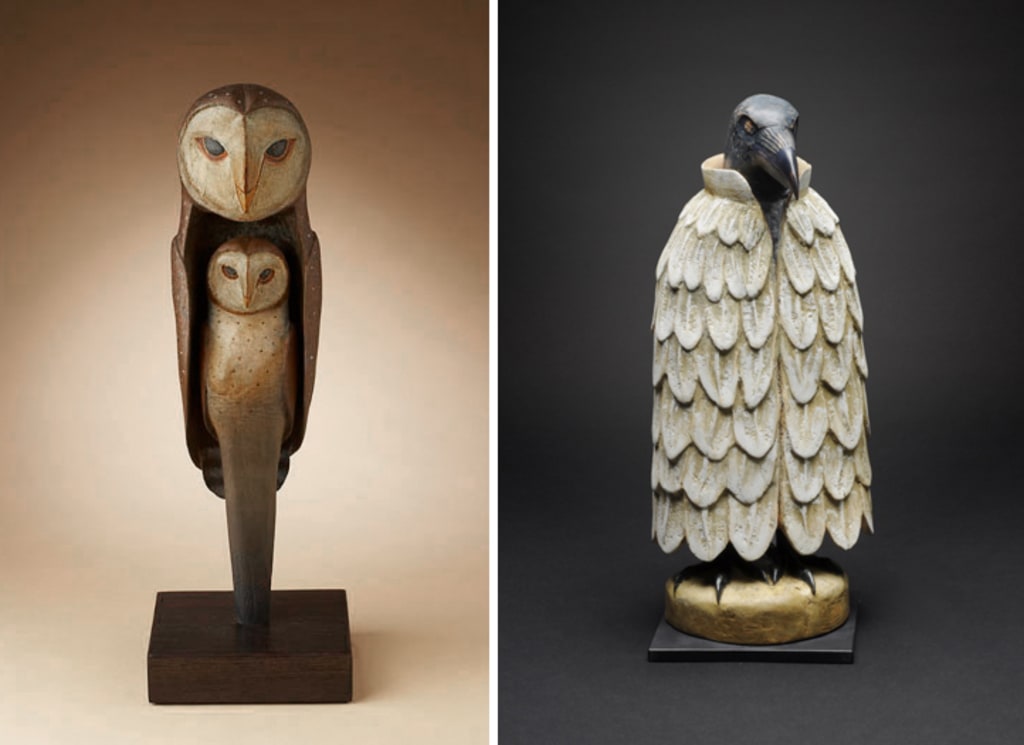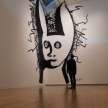Tangible Symbols
A story about real blessings and curses

I always thought it was a cruel joke that everyone, at some point in human history, looked at everything as symbolic.
I closed the door to my four door sedan and began the slow ascent up the gravel driveway to the "Family Cabin" that was flanked on all sides by towering, spindly pines that gazed down at me as I entered the sacred hall of "solitude" (hint: the cabin was only five miles outside of town, hence the quotes around solitude). This was the same family cabin that had been passed down through my grandparents onto my mom and then, eventually, whenever I figure out the hell I'm doing with my life, it would be passed down unto me. Which is terrifying because, well, what do you do when you have a giant old, creaky, downright haunted piece of real estate that you only use to sit behind a laptop and keyboard? Look at the trees, see some faces in there and divine some weird-ass story about finding yourself in nature?
No thanks; I'll take ramming my head into a brick wall, figuratively and literally.
I walked through the decrepit screen door with holes in that kind of defeated the whole point of having a screen door, but, here we were anyway. The close cut shag carpet instantly washed over me in a wave of dust, vague hints of disinfectant, and nostalgia. Taxidermy of fish, deer, and various other symbols of conquest adorned the walls in a strange kaleidoscope of deep South and musty old days of glory. The chairs, oh so luscious in worn leather and soft, plushy material made a ring in the living room like an arena of rest and slumber.
Home sweet, smelly home.
I made my evening preparations; pulled up a chair, let the recliner recline, and had my laptop and dozens of tabs open, ready to go on my "writing journey" (as much as I can journey sitting in a chair, nobody to be seen for at least a few miles). Of course, I can't go on without at least making myself a sandwich from various lunch meats in the fridge, and, oh right, we can't do it without some provolone on that shit too, and where are the damn chips? What's a guy gotta do to have a nice, cold can of beer to have around here?
As I rummage through the cupboards like a bipedal raccoon, my fingers glaze over something sitting on the counter, and upon looking at it, I see the distinct icon of the silhouette of a stereotypical Native American man on a pack of Natural American Spirit cigarettes sitting there, offering me a sultry prize of nicotine and rat poison. Mom must have left those here, I thought to myself.
Looking at the (probably) culturally appropriated Native American on the logo made me think about the (probably) not true stories that my grandma would tell me about the Chickasaw and Choctaw tribes that lived around here, and how they had built teepees on our land at one point in time and "if you doubt me, you can just go to the county museum and look it up! It's there, alright!"
The thing she would normally say about the Natives that lived around here that got to me the most though was how they saw everything as symbolic of something else; rain meant fertility and new life, buffalo meant humility, and that the circle represented time, death, and rebirth.
Call it white privilege (which it probably is), call it cultural ignorance (again, also probable), but it all seemed so...exhausting, somehow, just from a story teller's perspective. Think about it; it's not just that you're living in a time where you had to secure everything for yourself, but, at the end of the day, if you're the one telling the story at the end of the day, you have to somehow impart these grand yet simple meanings into a whole story about how someone killed a buffalo, or how they outran coyotes, or how the Rain Woman brought rain that evening.
And as I sat there, droning away at the keyboard looking to write for a blog about finding the right subject for a podcast interview on the one hand and also writing a short story about a man finding new meaning in his relationship with his mom in the other, I couldn't help but settle on this one thought that ran amok: it's all darkly ironic in a cruel, sardonic way. Cultures in Europe had to find new allegories to discuss mass death from things like the Bubonic Plague in the form of a masked plague doctor to distill what lesson exactly? That germs=bad and mortality is fleeting? Chinese folklore often refers to cats as symbolic of warding off evil spirits, and sure, some of that definitely checks out because cats are apex predators that have night vision and are normally highly vigilant, but think about the logistics for a second. “Ladies and Gentlemen, in this corner, weighing in at an impressive 10 pounds and 5 ounces, here to fight against the tide of darkness and evil spirits invading your home, it’s your house cat!”
I don’t mean to be disrespectful; after all, many of these symbols have a sacred history attached to it that precedes scientific understanding and that they helped form thousands of cultures across the world. But some of these other symbols always confused me to a certain degree; for example, why is a barn owl a harbinger of death for Native tribes in North America? Sure, they’re extremely efficient killers and can rotate their head 360 degrees like the little girl from The Exorcist, but it’s not like their immediate presence, at least in my mind’s eye, screams things like, “Impending doom! Beware...the barn owl.” Yet, animals like vultures totally make sense because, well...they circle around dead things, so it would naturally make sense to look at a vulture and attribute, “Oh shit! Vultures are near, so death must be near!” to them.
As I sat there, staring at my computer screen and its sterile blue light glow as it enveloped me in unfinished projects, I couldn’t help but think, on top of the thinking I was already doing: if I was a Native or Indigenous person, just going around in the woods, gathering or hunting for my food, and I’ve already got a lot of internal issues going in my tribe (maybe I got reprimanded by a Chief or by another elder, maybe the season has been rough, something like that), and, all of a sudden, a barn owl. Just poof, right there, swooping in from the far reaches of the tree canopy, as it plucks a shrew off the forest floor, its talons sinking deep into the flesh, and, as it lands on a tree branch 100 feet ahead of me, snapping the shrew’s neck, and holding it in its claws like a sickly trophy. The moonlight dances around its wingspan, and illuminates this specter like figure of flapping death and extreme efficiency, and all I could (probably) think in this imaginary scenario as a Native person is probably the modern day equivalent, “Shit. That’s scary man.”
And then, later that night, as I lay on my bedroll, after having spent a considerable amount of time staring up at the sky and all of Chitokaka’s cosmic tapestry mapped out in the night sky, not tainted by any light pollution or other unnecessary noise, I’d lay down, and dream of that owl. I’d probably see it as even more terrifying, and how it would bring my mother, who was suffering from an unknown disease to me, coughing her lungs out, to her death bed; she’d hold my hand, as the Great Owl would preside over this scene of quiet carnage and pestilence, and tell me to honor the rains that bring us good crops and berries to eat, and to honor the deer that allow us to eat of them, and to continue honoring my elders the way that I do, and would pass right there, right in front of me. The Owl would then extend its wings to a clearing, with the standard six, red painted poles to mark the grave sit, and I’d sit her up into sitting position, bury her, and watch as the rains would come by, create new grass out of her remains, and from there, the cycle would start all over.
I opened my eyes; the remaining sunlight from the late afternoon had given way to twilight, as the moonlight seeped through the open blinds by the window. Damn, I thought to myself, kicking myself, I fell asleep. I roused myself enough to sit up and out of the chair, and moved to make myself a cup of coffee over by the ancient coffee maker. I looked over at the Native American Spirits cigarettes label and felt inclined, after having the dream I just had, threw them away and adequately spat on them.
Looking over at the blank page, I felt a new sense of dread; what if I couldn’t even crack up to be the writer I always wanted to be? What if I was just doomed to stare at blank pages, and for all they could potentially be, rather than make that potential real? What if I was just relegated, for the rest of my life, to having to explain what I wanted my career to be to my family, rather than having that career?
What if my dreams had just been dead on arrival the whole time?
As I sat there silently cursing the laptop, I heard a small woosh just outside on the porch, and instantly stood up straighter. I grabbed the bat by the screen door leading out to the porch, readying myself for the worst; who could be out here at this time by myself? I didn’t hear a car or anything roll up on the gravel.
After a moment of gulping and taking some deep breaths of telling myself everything was fine even though it was very possible that it could not be fine, I opened the screen door.
On the porch railing, there it was: The Barn Owl. In its talons, a shrew, gasping for life that would soon be relinquished. The Barn Owl’s eyes slowly blinked, seeming to question me as its head stood, resolute in its position.
And that’s when I realized the symbols weren’t a cruel joke; they were tangible blessings and very real curses. It just depended on what I wanted to do with them after.
About the Creator
Ben Howard
Condensed form that is two parts bitter, angry old man wringing his fist at a world that refuses to change, the other being a river otter haphazardly whittling away at a keyboard. In less obnoxious terms, I write things sometimes.
He/him.






Comments
There are no comments for this story
Be the first to respond and start the conversation.